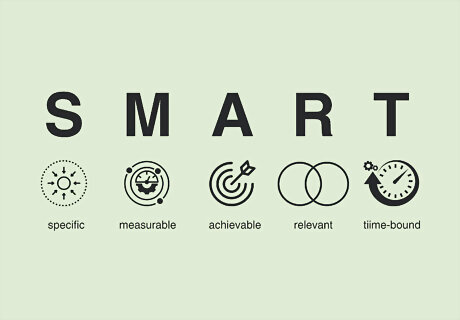
views
Developing a High Performance Mindset

Build self-awareness by reflecting on your beliefs and behaviors. Self-awareness is the ability to regulate and reflect on your emotions, thoughts, and behaviors, and how they impact your performance. Start to raise your self-awareness by writing your feelings in a journal and allowing yourself to feel your emotions as they pass. You can also make a list of your top priorities in life, identify your strengths and weaknesses, and incorporate stress relieving activities like meditation or reading to prevent burnout.

Embrace challenges and try to be open to feedback. You’re only human, and you will make mistakes. However, focusing on learning from those mistakes rather than feeling paralyzed by failure can help you move forward. Try to focus on what you can control and push forward through challenges. If you constantly think, “What if I fail?” or “If I don’t try, no one can see me fail,” try to replace that inner dialogue with thoughts like, “I’m not sure I can do it, but it’s worth a try” or “Even if I do fail, I’ll know better what to do next time.” Learn to accept feedback and constructive criticism by giving yourself time to cool off, considering the motivation behind it, and acknowledging where they might be right.

Set realistic, attainable, and measurable goals. Writing a SMART goal can help you focus your attention and resources so that you can successfully accomplish your priorities. Start by developing an end result that you want to achieve, such as the completion of a work project or getting promoted to manager. Write your goal down, making sure it is: Specific: Include who needs to be involved, what exactly you’re trying to accomplish, what obstacles or requirements might stop you from achieving your goal, and why you’re setting this goal in the first place. Measurable: Think about what metrics you’re going to use to determine if you meet the goal. For example, if you’re trying to write a paper over three months, you might set smaller deadlines like completing the research, creating an outline, drafting the essay, and so on. Achievable: Consider how you’re going to accomplish the goal, whether you have the tools or skills necessary to complete it, and if you don’t, what it would take to get the tools or skills needed. Relevant: Choose a goal that aligns with your business or company’s objectives or your personal values. Time-bound: Think about how much time is needed to realistically accomplish your goal. For example, you might decide that running a marathon as a beginner might take 3 months of training.

Create an action plan to help you break your goal into manageable steps. After you’ve defined what your goal is, create an action plan by identifying your end goal and breaking it down into all the steps you need to take to reach it. Take your goal and write down specific things you’ve already done to help you reach your goal, then write the next logical steps. If your goal is to open your own bakery, you might write down that you’ve already done research on how to start a business, but now you need a location, a business plan, and investors. If your goal is to climb Mount Everest, you might write down that you’ve already bought all the equipment and plan to go to the gym 5 times a week to train.

Manage how you spend your time so you can complete your goals. Keep track of how you spend your time each day for a week or two and list out which activities you do are priorities, and which ones are less important or urgent. Setting priorities and managing your time effectively can, over time, improve your performance. For example you could try to keep a “to-do” list full of small manageable tasks each day and aim to mark off the highest priority items each day. You can also improve the time you spend processing information by implementing organization systems. For example, you might set up a color-coded system for your email so you can easily refer back to things you need to complete or follow-up on.

Consider what you can control, and ignore what you can’t. People with a high-performance mindset have a more internal locus of control, which means they believe that what happens to them is influenced by their own abilities, actions, or mistakes. To develop a strong internal locus of control, identify when you feel self-pity or when you blame others for your hardships or negative feelings. Once you’ve identified your feelings, focus on the parts of the problem that are in your control and try to let go of the rest, including reactions from other people around you. People who have an internal locus of control tend to be more successful, happier, and healthier than those with an external locus of control.

Trust that the small gains you make will get you closer to your goals. Success can be thought of as a marathon, not a sprint. It requires persistence and patience to commit to a process of success and not give up when you don’t immediately get the results you want to see. By putting in the miles, you’ll start to see long-term gains. For example, going for a bike ride might not feel like anything is happening, but when you ride every day, you might start to build more muscle and increase your endurance. Although they might feel small, appreciate any gains you make. When you accomplish a task, take a moment to congratulate yourself. Even the small steps you take will get you closer to what you set out to achieve. High performers also understand the importance of cause and effect—if you put in the work, the results will come in time.

Incorporate what you’re passionate about into your work. Being happy at your job and loving what you do can not only enhance your performance and boost your productivity, but it can help you overcome obstacles. If you aren’t passionate about the work that you do, try to find the significance in your efforts, build healthy relationships with colleagues who share your goals, and practice gratitude. Try keeping a gratitude journal and writing down 8 things you’re grateful for every day to help you focus on all the wonderful things you have in your life instead of what you’re missing.

Cultivate healthy relationships in your personal and professional life. Strong, positive relationships with other people can not only improve your self-confidence, but they can increase your sense of belonging and purpose. Build healthy interpersonal relationships by empathizing and providing your friends and family with constructive feedback and support. Try to actively listen to the important people in your life by giving the other person your full attention, maintaining eye contact, and asking open-ended questions to clarify what they say.
What is a high-performance mindset?

A high-performance mindset is believing you can improve and achieve your goals. A high-performance (or peak performance) mindset is all about embracing a growth mindset, which is built on the idea that you can improve your character, intelligence, and creative ability in a meaningful way through effort and experience. High performers see failure as an opportunity for growth and take action to work towards their goals every day. A mindset is a set of beliefs, attitudes, assumptions, and expectations that shape how you think about and approach different situations and obstacles. Developing a high-performance mindset isn’t just about achieving success, but cultivating a sense of purpose, fulfillment, and satisfaction in your life.
Why is a high-performance mindset important?

High-performing employers may build more successful work cultures. Individuals with a growth, or high-performance, mindset are open to feedback and can adjust to changing circumstances. This can push them to adopt more diversity, equity, and inclusion practices, leading to higher job satisfaction, increased production, and lower turnover rates. High-performing employees are also more likely to value a person’s willingness to learn and grow, encouraging employees to develop new skills and take on challenges. One study found that employees at a fixed mindset company were more likely to worry about failing, believe that only a handful of workers are highly valued, and cheat to try to get ahead.

Workers with a high-performance mindset may be more adaptable. Having a growth mindset means you can quickly navigate turbulent workplaces, feel more confident handling challenges, and break problems into manageable steps. This can lead to better work-life balance and a better sense of empowerment and satisfaction with your job. One study also suggests that an employee’s growth mindset is closely related to their ability to innovate creative solutions to problems.

A student with a high-performance mindset might get better grades. Think about 2 people about to take a math test. One believes they aren’t good at math, so they might not try as hard or give up completely. The other believes they can understand the concepts if they study hard enough, so they might study longer before the test or keep attempting each problem. As a result, the person who studied for longer might get better scores on the math test than the person who believed they could never improve their skills. The first student has a “fixed mindset,” which means they believe that their intelligence or motivation is not in their control. This can cause them to give up in the face of failure. The second student has a high-performance or growth mindset because they know that they can improve their abilities through effort and determination.

High-performing athletes succeed more in-season. Athletes with a high-performance mindset fulfill their potential by creating effective strategies and working hard in the face of challenges. One Stanford study found that athletes who believed that practice and hard work led to athletic success had more success during their next game season. A runner with a fixed mindset in last place might see it as confirmation that they’re not good enough to win or that the race is already over for them. A runner with a high-performance mindset, on the other hand, might recognize that as long as they’re still going, they have the opportunity to turn the tides in their favor. The study also found that coaches who believed in practice and hard work over natural ability also had more success, meaning that athletic leaders may also succeed more with this mindset.
Key Traits of a Person with a High-Performance Mindset

Fully engaged in the present moment High performers can focus on the now and control their emotions in difficult situations. Instead of dwelling in the past or constantly worrying about the future, they’re fully engaged in the present and make each moment count. For example, if they’re an athlete, they might enter a game fully attentive and engaged and try to do their best every minute of it.

Belief in themselves and their ability to achieve their goals High performers know that they can control their fate if they work hard enough and push forward what they want to achieve. They know what they can and can’t control and know that if they put their nose to the grindstone they can come out the other side a better, more accomplished person. High performers also tend to have a positive attitude because they know that things will work out in the end.

See challenges as opportunities for growth instead of obstacles High performers see failure as a springboard to learn and grow. Instead of avoiding challenges, they embrace them and continue moving forward despite setbacks. They learn from criticism and their past mistakes and find lessons in the success of others. They also believe that with enough time and effort, they can build on their skills, knowledge, and abilities, and become a better, more rounded person.

Self-disciplined and proactive in taking actions toward their goals High performers have a strong sense of purpose and a clear vision of the future they want to achieve, which helps them stay motivated. They’re always innovating and seeking ways to improve their performance, and approach challenges with determination and resilience. High performers are also incredibly driven and proactive, trying to control potential problems while they’re happening instead of reacting after they’ve already happened.


















Comments
0 comment